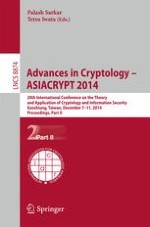2014 | OriginalPaper | Buchkapitel
Adaptive Security of Constrained PRFs
verfasst von : Georg Fuchsbauer, Momchil Konstantinov, Krzysztof Pietrzak, Vanishree Rao
Erschienen in: Advances in Cryptology – ASIACRYPT 2014
Verlag: Springer Berlin Heidelberg
Aktivieren Sie unsere intelligente Suche, um passende Fachinhalte oder Patente zu finden.
Wählen Sie Textabschnitte aus um mit Künstlicher Intelligenz passenden Patente zu finden. powered by
Markieren Sie Textabschnitte, um KI-gestützt weitere passende Inhalte zu finden. powered by
Constrained pseudorandom functions have recently been introduced independently by Boneh and Waters (Asiacrypt’13), Kiayias et al. (CCS’13), and Boyle et al. (PKC’14). In a standard pseudorandom function (PRF) a key
k
is used to evaluate the PRF on all inputs in the domain. Constrained PRFs additionally offer the functionality to delegate “constrained” keys
k
S
which allow to evaluate the PRF only on a subset
S
of the domain.
The three above-mentioned papers all show that the classical GGM construction (J.ACM’86) of a PRF from a pseudorandom generator (PRG) directly yields a constrained PRF where one can compute constrained keys to evaluate the PRF on all inputs with a given prefix. This constrained PRF has already found many interesting applications. Unfortunately, the existing security proofs only show selective security (by a reduction to the security of the underlying PRG). To achieve full security, one has to use complexity leveraging, which loses an exponential factor 2
N
in security, where
N
is the input length.
The first contribution of this paper is a new reduction that only loses a quasipolynomial factor
q
log
N
, where
q
is the number of adversarial queries. For this we develop a new proof technique which constructs a distinguisher by interleaving simple guessing steps and hybrid arguments a small number of times. This approach might be of interest also in other contexts where currently the only technique to achieve full security is complexity leveraging.
Our second contribution is concerned with another constrained PRF, due to Boneh and Waters, which allows for constrained keys for the more general class of bit-fixing functions. Their security proof also suffers from a 2
N
loss, which we show is inherent. We construct a meta-reduction which shows that any “simple” reduction of full security from a non-interactive hardness assumption must incur an exponential security loss.
